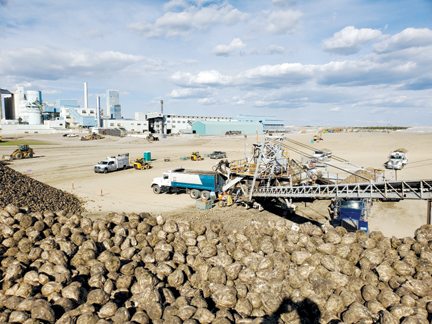Current Temperature
15.0°C
Lantic reporting solid beet yields in 2021
Posted on September 22, 2021 by Taber Times TIMES FILE PHOTO
TIMES FILE PHOTOBy Kenyon Stronski
Local Journalism Initiative Reporter
reporter@tabertimes.com
As the nights and days get cooler and the trees replace their green leaves with yellow and red, the time for beet harvest has arrived. The summer was warm and dry, but Lantic Inc. Agricultural Superintendent Bryan Avison assured the beets remained relatively unaffected by the abnormal weather.
“The beets had a lot of sunshine and warm weather along with lots of irrigation water, so they’ve done remarkably well. It could be an estimated close to a record crop,” he commented. “Irrigation management is challenging. The growers had to make sure they managed all the irrigation scheduling correctly, yet the majority of our growers are excellent irrigators and they’ve never shorted the crop with water.”
Avison also mentioned the yield last year was quite good as well, averaging just over 30 tons an acre while this year are expecting the same or even better.
“2017 was the biggest crop we had and we harvested around 32 and a half-ton per acre — which was a record for the southern Alberta sugar beet industry, so we’ll see. I don’t have a crystal ball, but yield indications right now are really good, so we’ll see where we are at the end of harvest, but I believe it’s going to be a really good crop.”
Currently, the Enchant, Vauxhall, Taber, and Burdett piling stations have been running since Sept. 6. The Picture Butte, Tempest and Coaldale stations will start up this week. The campaign for the factory began on Sept. 9 and is expected to go around 150 days.
“Campaign has been going quite well. We’re going to keep our nose to the grindstone here, get the crop in, and get it processed.”
Avison also mentioned safety is the first priority for Lantic.
“We take safety very seriously. Every employee takes part in the safety program and we want everyone to feel safe when they’re at work and go home in the same condition they were in when they got here.”
The growers were contracted to grow 28,000 acres of beets this year, and this number fluctuates between 28,000 and 30,000 from year-to-year.
“I don’t expect that to change much. With our plant capacity, we have to be able to process the crop in a timely fashion, so I would expect it will stay at that average for a while. Our nominal capacity is 6,000 metric tons per day. So, we process an acre of beets in about seven minutes, and about eight-and-a-half acres an hour.”
As is usual for the early fall months, the weather is cool at night and gets warmer throughout the day. Avison mentioned weather is always a risk, and being that 6,000 metric ton per day is their plant capacity, they want to try and tailor the crop size to it.
“We have some flexibility and elasticity with starting dates. We can change it to accommodate more beets, but we don’t really want to start much earlier than this year. The worst thing for us is the fluctuating temperatures — going from extreme cold, then to having a Chinook or several warm days after a big freeze. That’s really an undesirable situation for beet storage, but we’ve been processing and storing beets in Alberta for a long time and there’s the odd year where it doesn’t go exactly as planned, but there’s a lot of excellent years for storage and I hope this will be, as well.”
Avison also assured the cool nights are good for the accumulation of sugar.
“The beet itself is preparing for winter, so it builds up sugar (carbohydrate) reserves in the root and as the nights cool off, you can have more accumulation of sugar in the root. It’s just preparing for regular dormancy. Naturally, it would use that sugar in the next year to produce a seed, but we harvest it when it’s full of sugar and then we put that sugar in a bag, so you can put it in your coffee.”
“I wish the growers well and hope you all have a safe harvest, and enjoy the experience of it all.”
Leave a Reply
You must be logged in to post a comment.

